The Google Nexus 9 Review
by Joshua Ho & Ryan Smith on February 4, 2015 8:00 AM EST- Posted in
- Tablets
- HTC
- Project Denver
- Android
- Mobile
- NVIDIA
- Nexus 9
- Lollipop
- Android 5.0
GPU Performance
While Denver is new, the Kepler GPU in the Tegra K1 is mostly a known quantity by now. In the Nexus 9, the GPU is still a single SMX clocked to 852 MHz. In order to verify performance, we turn to our standard test suite. For the most part, our GPU-bound tests are meant to represent gaming performance although tests like 3DMark can have CPU-bound aspects while GFXBench tends towards being a pure GPU test.
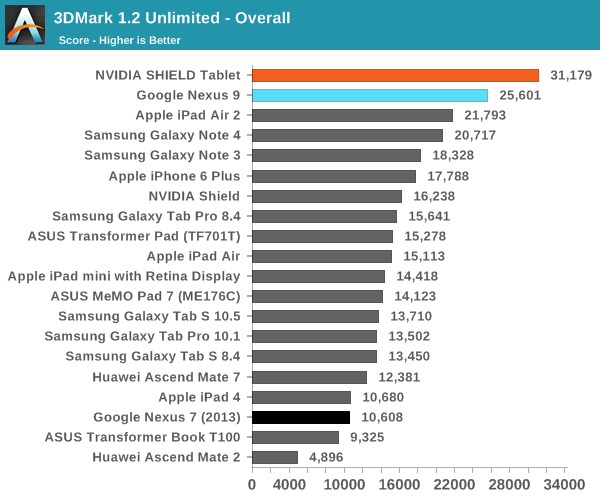
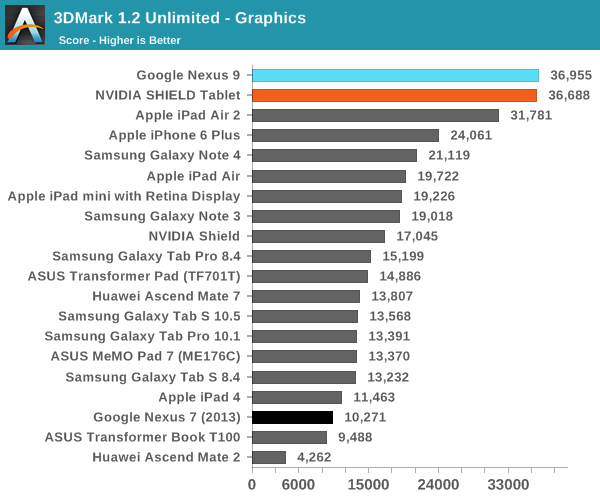
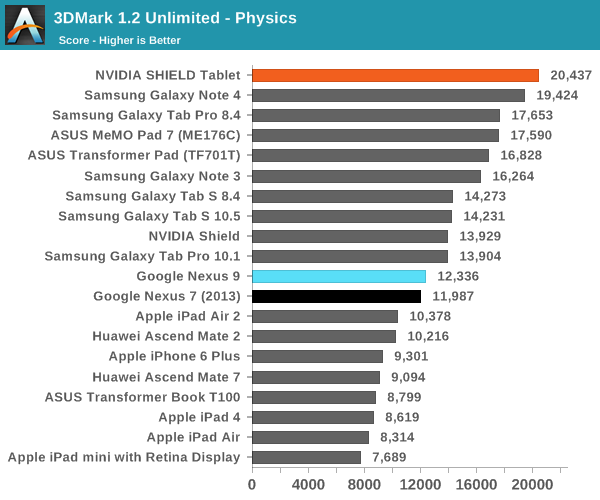
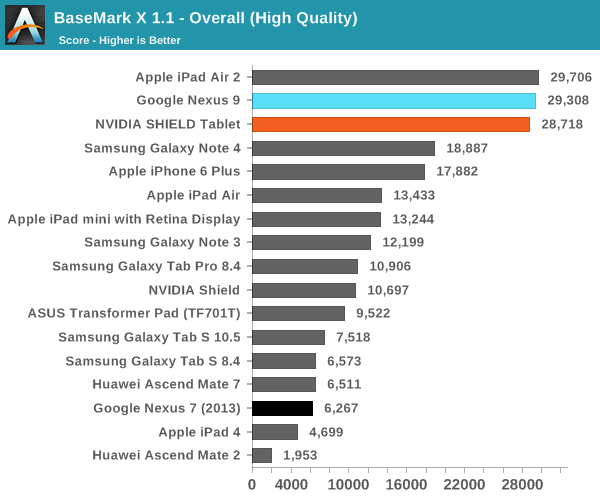
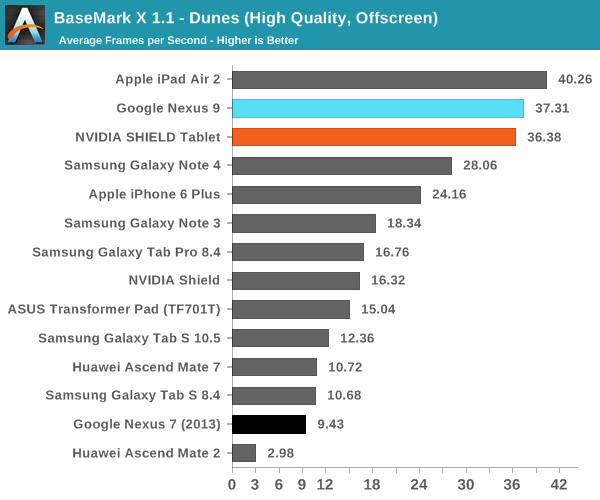
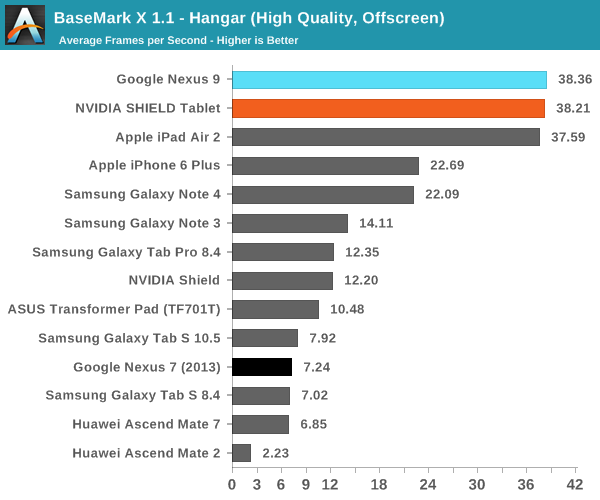
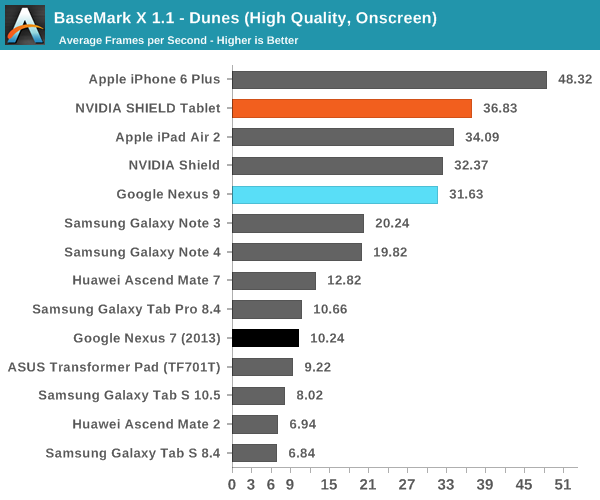
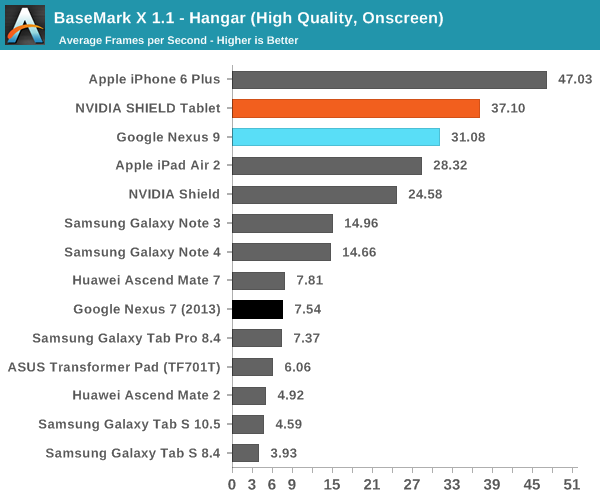
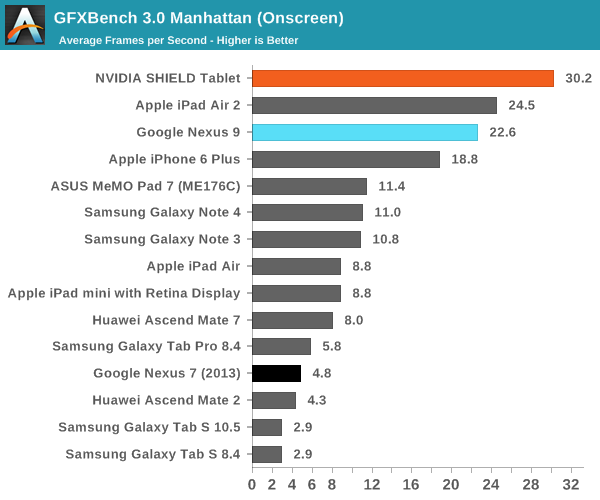
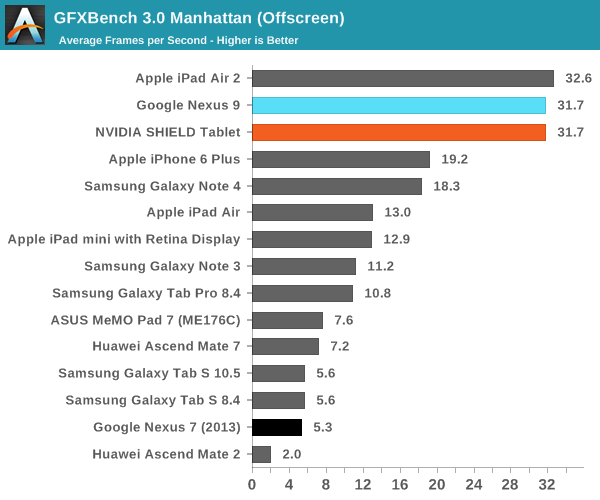
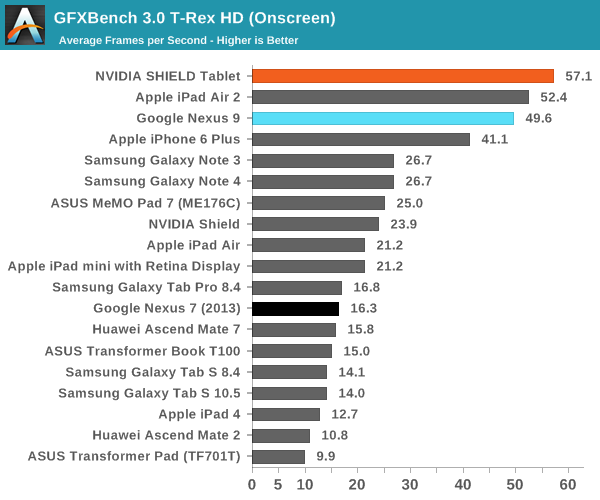
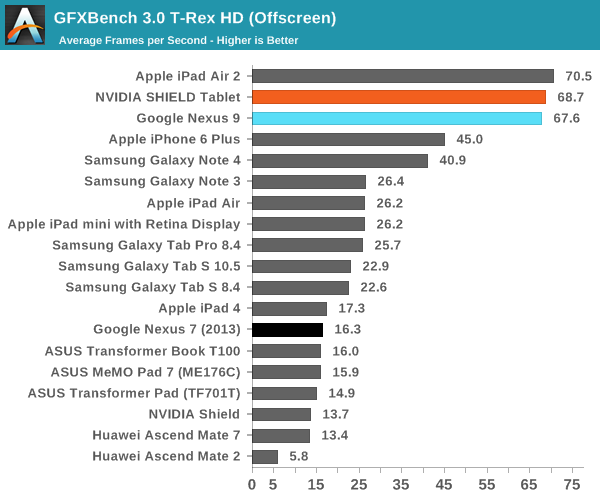
The Nexus 9's GPU has effectively identical performance to what we saw in the SHIELD Tablet, which means that the Nexus 9 should be able to support a broad range of games without performance issues. There is a bit of a noticeable performance delta when comparing on-screen performance, but this is simply due to the higher resolution of the Nexus 9's display. The one notable exception is the 3DMark physics test, which seems to scale with core count quite well, and that causes Denver to fall slightly short of the quad A15 configuration.
NAND Performance
While storage performance can often be secondary to a smooth user experience, poor storage performance is extremely painful. This is similar to RAM, where the difference between 2 and 3 GB is generally academic, while the difference between 512MB and 1 GB is enormous. While there have been some issues with Androbench with the move to Android 5.0, it seems that the timer issues have since been resolved, so it's possible to resume using the results from Androbench to get a rough idea of NAND performance.
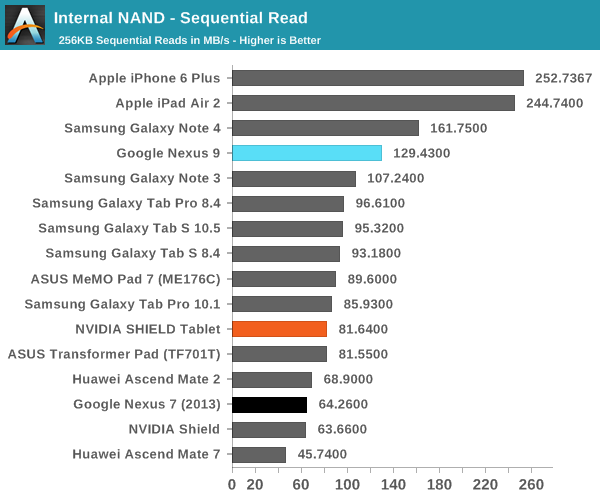
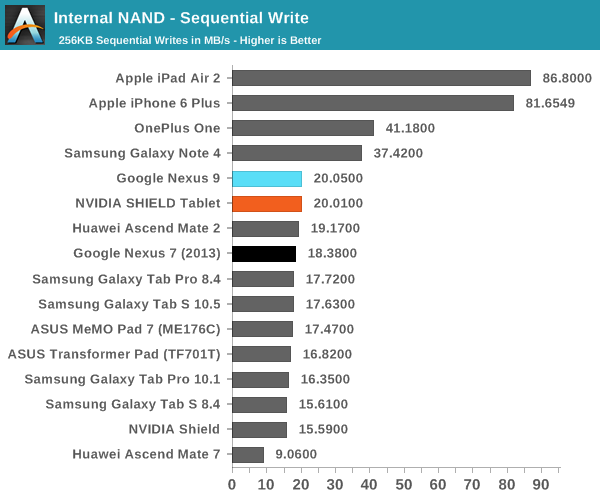
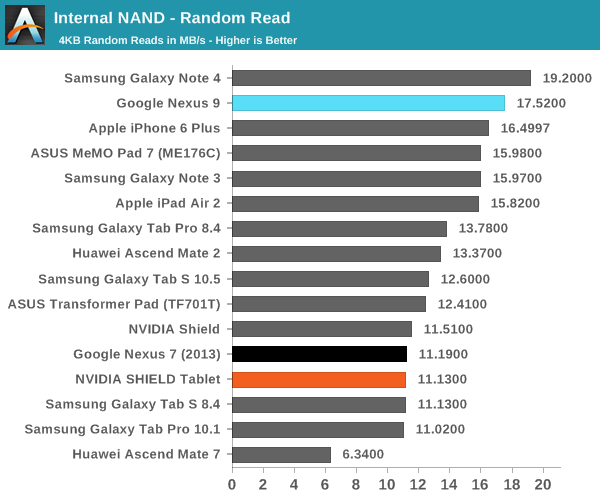
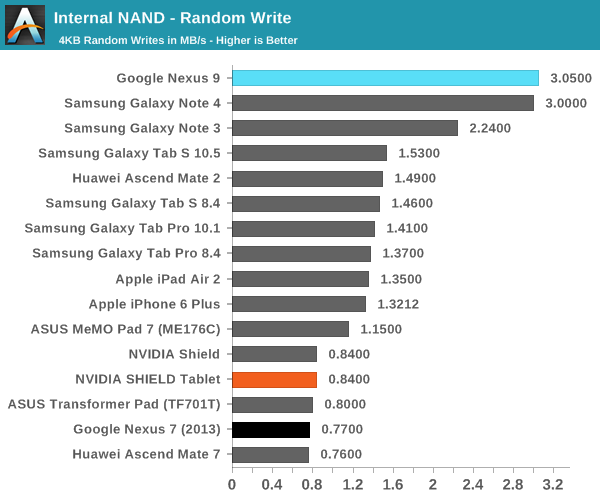
Here the Nexus 9 doesn't suffer nearly as much from full disk encryption that is forcibly enabled on the device; performance is noticeably higher than what we see in the Nexus 6. This seems to lend some credence to the theory that CPUs with ARM v8 ISA would be better suited to handling the need to encrypt and decrypt storage in real time. I tested the Nexus 9 with a custom kernel without full disk encryption to see how Androbench scores might change, but this didn't have a noticeable impact which seems to back this theory, although I'm still not confident that FDE is a good idea to enforce across all new devices.
The NAND itself, a Samsung eMMC package designated by the name BWBC3R, seems to be quite performant outside of pure sequential access, which seems to suggest that HTC hasn't skimped out in this area at all, and the use of F2FS is responsible for some of the best random I/O scores in any mobile devices we've tested thus far.










169 Comments
View All Comments
MonkeyPaw - Wednesday, February 4, 2015 - link
Maybe I missed it, but can you comment on browser performance in terms of tabs staying in memory? I had a Note 10.1 2014 for a brief time, and I found that tabs had to reload/refresh constantly, despite the 3GB of RAM. Has this gotten any better with the Nexus and Lollipop? Through research, I got the impression it was a design choice in Chrome, but I wondered if you could figure out any better. Say what you want about Windows RT, but my old Surface 2 did a good job of holding more tabs in RAM on IE.blzd - Friday, February 6, 2015 - link
Lollipop has memory management issues right now, as was mentioned in this very article. Apps are cleared from memory frequently after certain amount of up time and reboots are required.mukiex - Wednesday, February 4, 2015 - link
Hey Josh,Awesome review. As I'm sure others have noted, the Denver part alone was awesome to read about! =D
gixxer - Thursday, February 5, 2015 - link
There have been reports of a hardware refresh to address the buttons, light bleed, and flexing of the back cover. There was no mention of this in this article. What was the build date on the model that was used for this review? Is there any truth to the hardware refresh?Also, Lollipop is supposed to be getting a big update to 5.1 very soon. Will this article be updated with the new Lollipop build results? Will FDE have the option to be turned off in 5.1?
blzd - Friday, February 6, 2015 - link
Rumors. Unfounded rumors with zero evidence besides a Reddit post comparing an RMA device. All that proved was RMA worked as intended.The likelyhood of a hardware revision after 1 month on the market is basically 0%. The same goes for the N5 "revision" after 1 month which was widely reported and 100% proven to be false.
konondrum - Thursday, February 5, 2015 - link
My take from this article is that the Shield Tablet is probably the best value in the tablet market at the moment. I was really shocked to see the battery life go down significantly with Lollipop in your benchmarks, because in my experience battery life has been noticeably better than it was at launch.OrphanageExplosion - Thursday, February 5, 2015 - link
I seem to post this on every major mobile review you do, but can you please get it right with regards to 3DMark Physics? It's a pure CPU test (so maybe it should be in the CPU benches) and these custom dual-core efforts, whether it's Denver or Cyclone, always seem to perform poorly.There is a reason for that, and it's not about core count. Futuremark has even gone into depth in explaining it. In short, there's a particular type of CPU workload test where these architectures *don't* perform well - and it's worth exploring it because it could affect gaming applications.
http://www.futuremark.com/pressreleases/understand...
When I couldn't understand the results I was getting from my iPad Air, I mailed Futuremark for an explanation and I got one. Maybe you could do the same rather than just write off a poor result?
hlovatt - Thursday, February 5, 2015 - link
Really liked the Denver deep dive and we got a bonus in-depth tablet review. Thanks for a great article.behrangsa - Thursday, February 5, 2015 - link
Wow! Even iPad 4 is faster than K1? I remember nVidia displaying some benchmarks putting Tegra K1 far ahead of Apple's A8X.behrangsa - Thursday, February 5, 2015 - link
Anyway to edit comments? Looks like the K1 benchmark was against the predecessor to A8X, the A7.